Making for Medellín
November 23rd, 2012
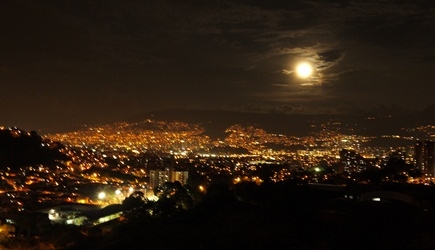
A Halloween full moon over Medellín, Colombia: our home until January as we take our half-time break, sit out the rain, and plot our route south…
No doubt you’ve worked out the pattern by now – give us a few weeks in a new country and chances are we will soon be extolling its virtues to anyone that will listen. “We love [insert name of latest country here]! The food is delicious, the scenery is beautiful, and the people – well, the people are just sooooo friendly!”
After almost 16 months of hospitality wherever we have been, it really shouldn’t come as any surprise that Colombia is also full of wonderful, generous people. Yet even by the high standards of hospitality we have become accustomed to on this trip, this country definitely raises the bar. After decades of civil war which kept all but the most intrepid tourists away, it feels like Colombians are still genuinely delighted to see visitors enjoying the country they proudly refer to as paradise.
“Cómo les parece Colombia?” (“What do you think of Colombia?”) they ask, before checking that their fellow colombianos have been looking after us well – and then invariably trying to outdo them in the hospitality stakes. We never ask for more than water and advice – but here you almost always get far more. I sometimes wonder if we are the unwitting (yet happily willing) beneficiaries of some kind of national hospitality competition.
It’s definitely the first country in which we have rolled into a tiny village to find the mayor and chief of police waiting in the square to formally welcome us. And the first where every day people on motorbikes slow down and ride alongside us for 10 minutes just for a chat and to wish us well. It’s also the the first where we have regularly tried to pay the bill for lunch or a snack, only to find that the friendly local we have been chatting to has already paid it for us. “Les invito!” (“I’ll get this!”), they say with a grin, telling us we need to save our money – and plainly ignoring the fact that we are clearly the rich gringos in this exchange.
And so, when we took the decision to sit out the worst of the Andean rainy season until the New Year, spending our time off the bikes in Colombia was an easy choice to make. The only difficult question in a country so huge and diverse was where to make our base. Colombians – never short of an opinion – were almost unanimous. “Medellín!” they said, directing us west from Santander towards the capital of the neighbouring state of Antioquia. “It’s the best place in Colombia to spend Christmas”.
And so here we are, puros campesinos (country bumpkins) finding our feet in a bustling city of 2.5 million people nestled high in the Cordillera Central. Somehow we’ve already been here a month, and it’s flown by. We’ve landed on our feet with a great group of new friends who in true Colombian style have been keen to immerse us in antioqueño culture and – even better – food. Chances are we will be leaving here a lot fatter than when we arrived which, given the climbs ahead of us, probably isn’t a bad thing. In between eating, we’re managing to squeeze in some volunteering, Spanish study and a much-needed overhaul of well-worn bikes and kit.
But first of course, we had to get here from San Gil, where we had stashed our bikes during our detour to El Cocuy. Like any east-west journey in this part of Colombia, it involved some range-hopping: from the Cordillera Oriental down to the Río Magdalena, before a steady two and a half day climb up into the Cordillera Central. Inspired by our back roads ride out of Bucaramanga, we chose to avoid the main road from San Gil to Barbosa, opting instead for a second dose of tough climbs and tranquil Santander pueblos…
James
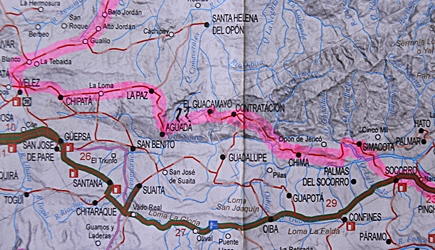
Our back route from Socorro to Vélez, taking in the string of pueblos nestled in the foothills of the Serranía de los Yariguíes: Simacota, Chima, Contratación, El Guacamayo, Aguada, La Paz and Chipatá.
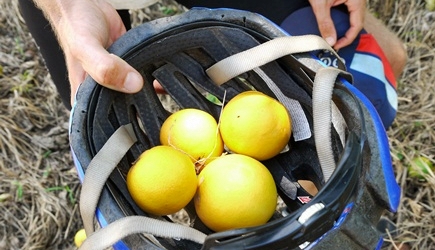
From Socorro it's a fast, paved descent down to the Río Suarez, interrupted only by a stop to pick up some fallen roadside oranges.
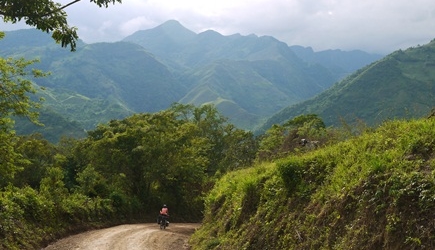
After a quick lunch of bread and queso de hoja (a traditional mountain cheese wrapped in banana leaves) in Simacota, we hit dirt and the beautiful Serranía de los Yariguíes opens up before us. In Colombia, down only means one thing…
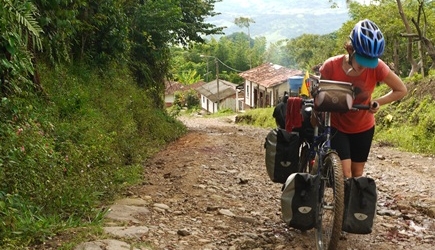
…pretty soon you'll be going up. Sure enough, leaving Chima, we hit a steep, rocky ramp which – Bedders would like to point out – has us both off and pushing. Despite my long-standing photo campaign to make it look like I never push my bike, I do. Regularly. I just push mine a bit quicker and happen to carry the camera…
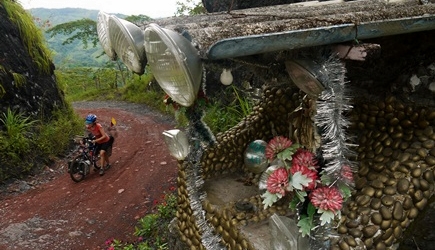
Up and up it winds, past a roadside shrine decked with car headlamps as offerings to ensure safe passage…
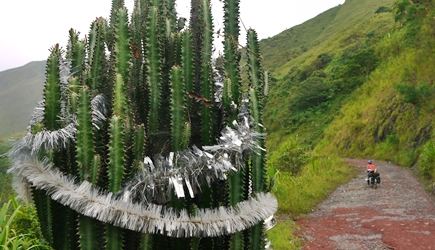
…and a slightly incongruous festive cactus.
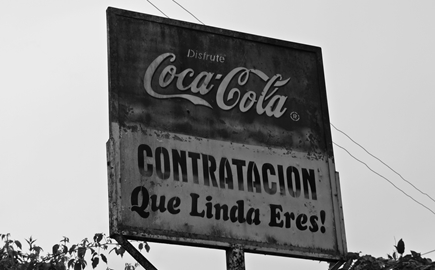
“Contratación – how beautiful you are!” – and indeed she was a welcome sight as we crawled in, wet and slightly bedraggled after an afternoon climbing through the mist and rain.
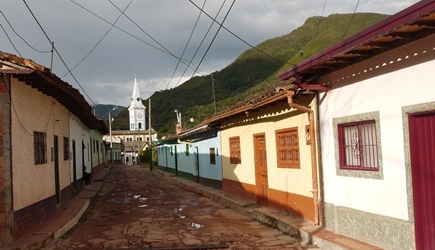
Making for the town square as usual to get our bearings, we don't even have chance to dry off before Colombian hospitality strikes.
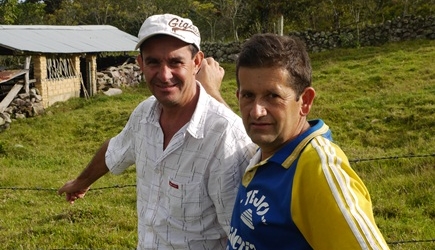
Rodrigo has a finca just outside town, and insists that we will be spending the night there. We certainly don't argue, and so off we set up the hill with him and his friend Orlando.
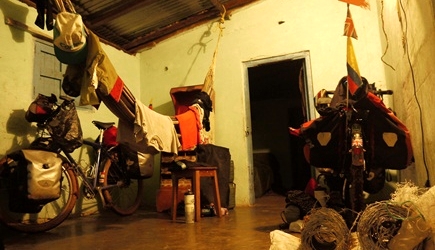
We expect to be staying in his house, but it turns out Rodrigo doesn't even live there, and we have the finca all to ourselves. Soon we have our wet clothes drying…
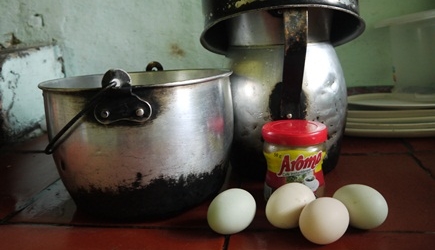
…and are tucking into the eggs that miraculously appear in the kitchen. Gracias miles Rodrigo!
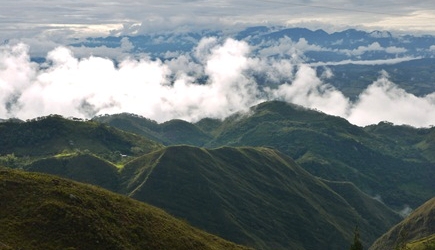
After a good night's sleep, we wind our way upwards again towards El Guacamayo, past the beautiful folds of the Serranía…
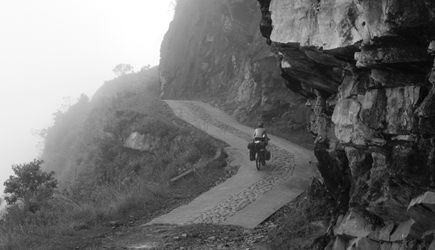
…and into the mist. A bemused local on a motorbike stops us to find out our story, and by the time we arrive in El Guacamayo the mayor and chief of police are waiting in the square to formally welcome us. “Is there anything we can do to help?”, they ask as the rain starts to lash down again. “The nearest bakery?”, we ask hopefully…
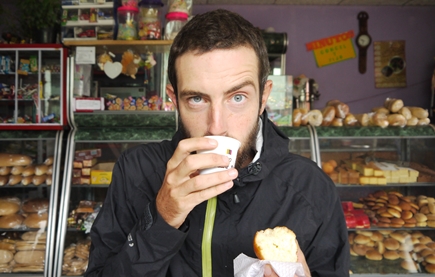
And so with our now obligatory second breakfast of tinto and buñuelos devoured, we set off for Aguada. Our map shows no route between the two, but according to the chief of police we have two options: the first steep and rocky, but shorter; the second longer but slightly less punishing. With memories of rocky pushes in Guatemala slow to fade, we opt for the second.
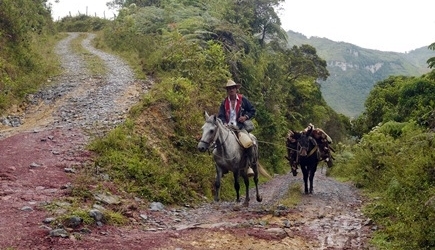
A fork in the road – up or down? Brain says down, horseman says up. Try asking again, just in case I misunderstood. It's still up – less rocky he says…
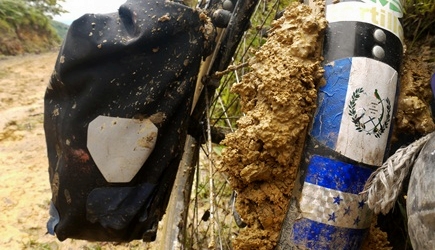
…which is true – but instead of rock, we get mud. Thick, slippery mud which within minutes clogs the gap between tyres and mudguards. With de-clogging sticks (technical term) now strapped to the back, it's a tedious descent to the river interrupted by stops to dig out the mud every couple of minutes…
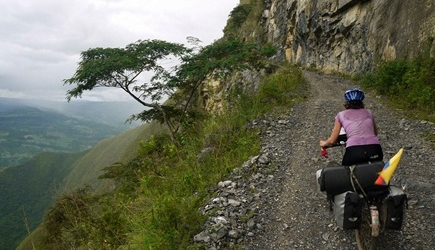
…followed by a punishing slog back up the other side on tired legs. Up and over the top, and finally we roll into Aguada – the end of a long day.
The next morning dawns cool, misty and wet as we skid our way up and down a final slippery dirt section to La Paz…
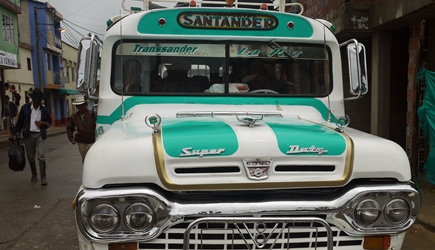
…where the paved road joins from Vélez, and the buses start again. It's a small village, but feels like a heaving metropolis after the peace and solitude of the last few days.
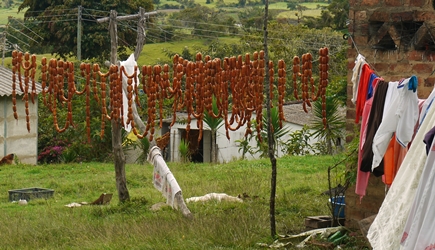
Now this is my idea of a washing line: locally made chorizo hanging out to cure along our route to Chipatá. It's a small village which proves to be the perfect place for a much needed day off to rest weary legs and dry soggy kit.
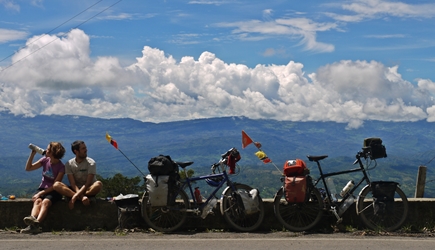
Refreshed and re-fuelled, we set off on the much smoother and faster second half of our journey to Medellín. Up and over the ridge beyond Vélez…a brief pause to take in the view…and then downhill all the way through Landázurri and Cimitarra to the Río Magdalena at Puerto Berrío.
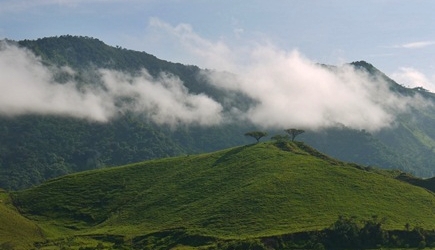
From Berrío we climb up into Antioquía, through idyllic pasture and sleepy villages. It's a rollercoaster ride: Medellín sits at only 1500m, but we climb a total of 5000m over two and a half days as the road inches its way up and up into the Cordillera Central until finally…
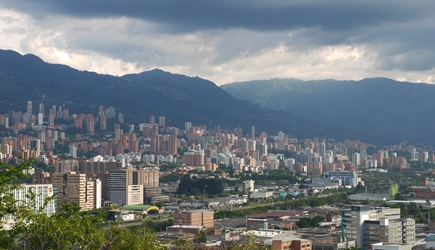
…the valley opens up and Medellín appears spread before us. After almost 16 months of very slow but almost constant movement, the prospect of stopping has never felt so appealing. We're ready for a break.